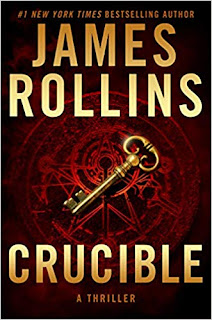2020 is almost here. I still cannot
believe 2019 has come and gone. For me, 2019 was a busy year so I
have not had the time to update Daniel's Corner Unlimited. However,
this year I read heaps of books and watched a ton of movies. So as
the year is drawing close to the end, I am writing this entry to
share with you, my top 5 favorite movies of 2019.
Number 5: Crawl
Genre: Horror
In Crawl, director Sam Raimi's returns to the world of Horror. If you haven't heard of Sam Raimi, he is the guy who
made cult classics like The Evil Dead and Drag Me to Hell. Crawl is a
creature horror movie in the vein of Jaws. The premise in this movie
is very simple; a young woman and her father became trapped in their
house after a category 5 hurricane brought some alligators to the
town. Obviously the story is unbelievable but this movie is hella
fun. If you are after a thrill ride then Crawl won't disappoint.
Number 4: John Wick Chapter 3 –
Parabellum
Genre: Action
The John Wick franchise is, in my
opinion, the best action movies of the decade. These movies woo the
audience with stylish cinematography, well choreographed fights, and
a fascinating world. It is an understatement to say these are some of
Keanu Reeves' best movies. The third installment in this franchise
brought a conclusion to the story of John Wick. There is a not a dull
moment in this movie and the fight sequences are stunning. John Wick
Chapter 3 is my favorite action movie of the year and I watched it
twice already. Will there be more John Wick movies in the future? I
hope so.
Number 3: How to Train your Dragon 3
Genre: Animation
How to Train Your Dragon requires
little introduction. I have been a fan of the series since the first
movie came out in 2010. I love the adventures of Hiccup, Toothless,
and their friends. The third entry in this franchise brought a
satisfying and heartwarming conclusion to their story. I applaud this movie for ending the
beloved series on the high note.
Number 2: Parasite
Genre: Black comedy/thriller
Parasite came from South Korea and it
is a surprise hit of the year. This movie became a darling to both critics and the general audience, worldwide. I saw this
movie recently and I think it is brilliant. The story follows a poor
family scheming to become employees at a very rich household by
posing as highly qualified people. I love the humor in this movie
because it is very dark, but it is also the type of humor that makes you think about the society and the underlying system. I especially like this movie as an excellent social
commentary about economic inequality (and climate change). This movie
has generated a lot of Oscar buzz and I think it will win
a few Academy Awards. There are so many symbols in this movie and I
can write pages and pages of discussions about the film, but instead I will just
recommend this movie to you and let you experience it yourself. By
the way, although I don't speak Korean but according to Dr. Google,
the song in the end credit is called "564 years". How does
the song relate to the movie? Well, it is significant but I won't
spoil it.
Number 1: The Farewell
Genre: Family drama
My number 1 favorite movie of the year is The
Farewell. This is a family drama with comedic elements and it will
warm your heart. The story is about a Chinese family coming to terms
with the news of their beloved grandmother dying from a terminal
illness. The casts in this movie put up excellent performances and
the story, while simple, is very powerful. The Farewell may be a
Hollywood production featuring a cast of racial minority actors and actresses, but this movie
is not an exploration of the east-west relation and cultural
differences. No, while the story is about a Chinese family, but you
can easily substitute it with an American family,
or a family of any cultural background, and the story will have the same impact and
power. This is because the themes in this movie are universally
relatable regardless of who you are, or where you are at, in life, and this movie is all the more beautiful for it. The Farwell
is a cinematic gem not to be missed.
That's it folks. From Daniel's Corner
Unlimited, I wish you a happy and successful 2020!





















